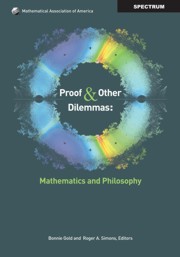Book contents
- Frontmatter
- Contents
- Acknowledgments
- Introduction
- I Proof and How it is Changing
- II Social Constructivist Views of Mathematics
- III The Nature of Mathematical Objects and Mathematical Knowledge
- 7 The Existence of Mathematical Objects
- 8 Mathematical Objects
- 9 Mathematical Platonism
- 10 The Nature of Mathematical Objects
- 11 When is One Thing Equal to Some Other Thing?
- IV The Nature of Mathematics and its Applications
- Glossary of Common Philosophical Terms
- About the Editors
8 - Mathematical Objects
from III - The Nature of Mathematical Objects and Mathematical Knowledge
- Frontmatter
- Contents
- Acknowledgments
- Introduction
- I Proof and How it is Changing
- II Social Constructivist Views of Mathematics
- III The Nature of Mathematical Objects and Mathematical Knowledge
- 7 The Existence of Mathematical Objects
- 8 Mathematical Objects
- 9 Mathematical Platonism
- 10 The Nature of Mathematical Objects
- 11 When is One Thing Equal to Some Other Thing?
- IV The Nature of Mathematics and its Applications
- Glossary of Common Philosophical Terms
- About the Editors
Summary
From the Editors
Stewart Shapiro, in this chapter, sets forth the questions that philosophers of mathematics have been trying to answer, dividing philosophers of mathematics along two axes: whether or not they believe mathematical objects exist objectively in some way (realism or nominalism of ontology), and whether or not they believe the theorems of mathematics are objectively true (realism or fictionalism in epistemology). He introduces the problems connected with each of these viewpoints, and describes how they developed. He then gives more details on several approaches that are receiving considerable attention currently, including neo-logicism (successors to Frege and Russell) and structuralism. Structuralism is immediately of interest because it appears that what we study in mathematics are structures—whether general structures such as topological spaces, or specific structures such as the real numbers. Generally, mathematicians are not very interested in what kind of thing a real number is (is it an object in some non-physical realm, a mark on a piece of paper, an idea in people's heads?), but in how it interacts with the rest of the real numbers. So in this sense, mathematicians study structures. Stewart Shapiro and some others (including Michael Resnik) have been trying to see whether that view of mathematics can resolve some of the philosophical problems that arise in a platonic approach to the philosophy of mathematics.
- Type
- Chapter
- Information
- Proof and Other DilemmasMathematics and Philosophy, pp. 157 - 178Publisher: Mathematical Association of AmericaPrint publication year: 2008

